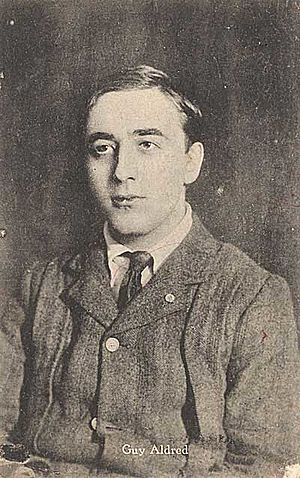United Socialist Movement facts for kids
Quick facts for kids
United Socialist Movement
|
|
|---|---|
| Abbreviation | USM |
| Leader | Guy Aldred |
| Founded | July 1934 |
| Dissolved | 1965 |
| Split from | Anti-Parliamentary Communist Federation |
| Headquarters | Glasgow |
| Newspaper | The Word |
| Ideology | Anarcho-communism Abstentionism |
| Political position | Far-left |
The United Socialist Movement (USM) was a political group based in Glasgow, Scotland. It believed in anarcho-communism, which is a political idea that supports a society without government or money, where people share everything.
The USM started in 1934 after some members left another group called the Anti-Parliamentary Communist Federation. At first, the USM wanted to bring together different socialist groups to fight against fascism, a type of extreme right-wing government. They also talked about creating a "Fourth International", which would be a worldwide group of revolutionary socialists.
During the Spanish Civil War, the USM changed its focus. They moved from just being against fascism to being against all wars (this is called anti-militarism). As World War II approached, the USM tried to form a "Socialist-Pacifist alliance". This meant working with different groups who also opposed the war. After the war, the USM became much smaller. It focused on abstentionism, which means not voting in elections. The group ran in a few elections but didn't win. The USM finally ended in 1965.
Contents
History of the United Socialist Movement
In August 1933, some important members, like Guy Aldred and Ethel MacDonald, left the Anti-Parliamentary Communist Federation. They then started a new group called the Workers' Open Forum (WOF). Guy Aldred also launched a newspaper called New Spur. This newspaper wrote about early anti-parliamentary thinkers like Mikhail Bakunin and Errico Malatesta. It also supported Marinus van der Lubbe after he was accused of setting fire to the German Reichstag building. The newspaper also criticized the idea of a "united front" between the Independent Labour Party (ILP) and the Communist Party of Great Britain (CPGB).
In January 1934, Guy Aldred joined the ILP. He was worried about the rise of British Fascism. He believed that creating a strong revolutionary anti-fascist movement was more important than anti-parliamentarism at that time. He felt that anti-parliamentary ideas were becoming less popular.
How the USM Was Formed
Guy Aldred's past views on anti-parliamentarism caused problems within the ILP in Glasgow. This led to him being removed from the party. His local branch in Townhead also left. In July 1934, this branch joined with the Workers' Open Forum to create the United Socialist Movement (USM).
Soon after, the Leeds Anarchist Group joined the USM. Later, some parts of the APCF in London and the former Hammersmith Socialist Society also joined. They formed a London branch of the USM by 1938.
In Glasgow, there was a fight for free speech. The USM nominated Guy Aldred to run in a local election for the Glasgow Corporation in 1934. He promised to support freedom of speech and assembly. However, he finished last in the election.
Working with Other Groups
Even though the USM and the APCF had split, they tried to work together in the 1930s. Guy Aldred wanted to build an "anti-parliamentary international". This would be a global group that included the USM, APCF, and other similar groups from different countries.
In May 1935, Vera Buch, a leader from a US group, came to Glasgow. She talked with the USM about forming a Fourth International, a worldwide socialist organization. She encouraged the USM to unite with the APCF. However, after she left, the groups stopped working together due to disagreements. Aldred's plans for this new international group did not succeed. The USM and APCF remained small and continued to argue over their differences.
Some members of the USM were unhappy with Guy Aldred's leadership style. They felt he often acted on his own. In June 1935, some members left the group because of this.
Feeling less hopeful about a revolution in Britain, Aldred decided that anti-parliamentary ideas needed to be heard again. In May 1936, the USM launched a new journal called Attack. It only had one issue. In an article for Attack, Aldred wrote about the role of workers' councils. He believed they were important for creating a temporary dictatorship of the proletariat, which means a state where workers have power. He warned that if a revolutionary vanguard (a small group of leaders) took power, it could lead to a party dictatorship and a new ruling class.
The Spanish Civil War and the USM
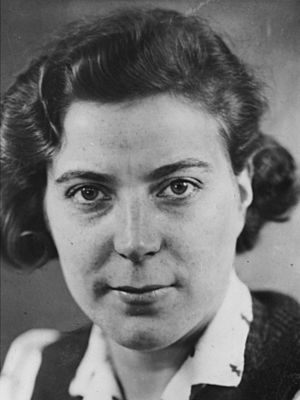
When the Spanish Civil War began, Guy Aldred called it "the mighty proletarian movement that Europe needed." The USM became very active again. In August 1936, the USM started a newspaper called Regeneracion. They also held many outdoor meetings. These meetings attracted large crowds, similar to those during the 1926 United Kingdom general strike.
On August 11, the USM asked workers' groups to hold meetings to support the Spanish Republicans. They also criticized the British government for not supporting the Spanish Republic. The USM even called for a recall election and said that anarchists should vote for any anti-fascist candidate who supported the Republic. They also threatened a general strike if the recall election didn't happen. Later issues of Regeneracion continued to support the Republic. Aldred criticized Britain and France for staying neutral. This meant the USM was putting aside some of its own beliefs, like being against elections and capitalism, to support the Spanish Republic.
The USM and APCF continued their disagreements during the first year of the civil war. Both groups wanted to be the official British representative for the Confederación Nacional del Trabajo (CNT), a Spanish workers' organization. Aldred claimed credit for increasing British support for the Republicans. However, the role was given to a joint group formed by the APCF and the Freedom Group. This allowed the USM to be more critical of what was happening in Spain.
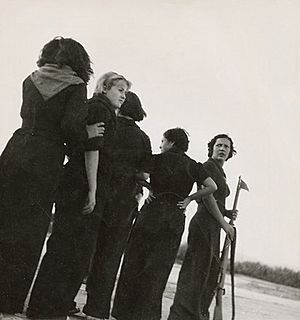
In September 1936, an appeal for weapons, money, and soldiers for Spain was published in Regeneracion. Aldred helped organize an "Anti-Parliamentary Column" to go to Spain. The USM chose Ethel MacDonald to represent them. On October 19, she traveled to Barcelona. There, she broadcast English language programs from the CNT's radio station.
Ethel MacDonald's reports back to Glasgow were different from the USM's first views. She explained how the Spanish Revolution was fighting against the Nationalists. She called it "the living demonstration of the power of the proletariat." MacDonald urged the USM to focus on workers' direct action rather than political inaction. By February 1937, the USM changed how it described the civil war. They now saw it as a "social revolution against capitalism" instead of "democracy against fascism." They began to openly criticize the Republican government. They even criticized CNT leaders, like Federica Montseny, for joining the Republican government.
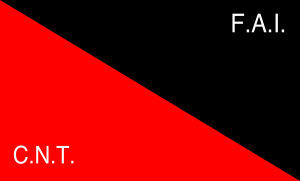
Around this time, the USM and APCF started to work together more closely. Their relationship improved after Frank Leech left the APCF in April 1937. They worked together to publish the Barcelona Bulletin. This bulletin shared stories from people who saw the May Days events. These stories supported the Revolutionary faction, which included anarchists from the CNT-FAI and Trotskyists from the POUM.
After these events, Ethel MacDonald was arrested and put in prison by the Catalan government. The USM and APCF worked together to form a committee to defend her. She was released and left Spain in September 1937, returning to Glasgow in November. After her experiences during the May Days, MacDonald said that fascism was just "the old enemy, Capitalism, under a new and fearful sounding name." She believed that "Anti-Fascism" was a new way to trick the working class.
After the events in Spain and reports about the Moscow Trials, the USM became more critical of the Soviet Union. They believed that the political repression in the Soviet Union, which led to the "Great Purge", started during the Russian Civil War. They said that the Old Bolsheviks, who had helped create the state's harsh rules, were now being punished by them.
In 1937, the USM, APCF, and ILP, along with the Revolutionary Socialist Party (RSP), formed the Socialist Anti-Terror Committee (SATC). This group was created to speak out against the "Great Terror" happening in the Soviet Union. In March 1938, the SATC published a pamphlet by Guy Aldred called Against Terrorism in the Workers' Struggle. In it, he accused the CPGB of supporting "terrorism" and "political corruption". He called for the destruction of Stalinist Communist Parties and compared fascism to Stalinism. However, the SATC soon broke up after the pamphlet was published. Aldred claimed this was because the ILP was trying to sabotage him.
USM's Anti-War Efforts During World War II
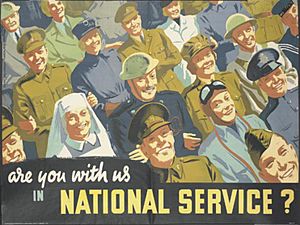
For a year, the USM's activities were limited. They published only one issue of the Word in May 1938 and another issue of Hyde Park in September 1938. But by May 1939, as the Spanish Civil War ended and World War II began, the USM became active again. They restarted the Word as a regular newspaper.
The USM changed its view from supporting "democracy against fascism" during the Spanish Civil War. They now saw World War II as a conflict between capitalist powers. They were against Britain joining the war. Guy Aldred asked: "Why should young men go forward to fight to acquire more territory to be plundered and exploited by American millionaires?" The USM also did not see a difference between the Soviet Union and the Western Allies. They believed the USSR was a capitalist state with the same reasons for war as other countries. They again compared fascism to Stalinism. After the British government put in place Defence Regulation 18B in May 1940, Guy Aldred argued that this rule had turned the United Kingdom into a dictatorship.
The USM organized its anti-war activities by directly opposing military involvement. Some members even felt it was wrong to own or carry a gas mask. The USM worked with the APCF and Glasgow Anarchist Federation to create the No-Conscription League. Guy Aldred was the chairperson of this group. They published a pamphlet explaining the rights of conscientious objectors (people who refuse to fight in wars for moral or religious reasons). They even offered legal help to these individuals. Some USM members, like John Taylor Caldwell and Guy Aldred's son Annesley, were able to avoid military service completely. Others only got a temporary exemption after long court cases and prison sentences. The USM also criticized the CPGB for changing its stance on the war. They pointed out how the CPGB stopped talking about anti-imperialist class war to support the war.
The USM, led by Aldred, tried to form several alliances during the war. They worked with Labour Party politicians and many Christian pacifist groups. They even printed some of their articles in the Word. Aldred was criticized by other USM members for working with certain groups and individuals. He defended the newspaper's decision to publish different views, saying it was for free speech. He declared the Word open "to all Pacifist and all Socialist opinion."
After the War: The USM's Decline
After World War I, there was a wave of revolutions. Guy Aldred had thought that the end of World War II would also lead to a crisis and revolution. However, this did not happen. After the Allied victory in Europe, a general election was called. Aldred ran as the USM candidate for Glasgow Central. His platform was against war, against strong government control, and for not voting in elections. He also supported a social credit system, which was different from traditional communism.
Like his other election attempts, Aldred finished last in the polls with only 300 votes. He was defeated by the Unionist candidate, James Hutchison, who won 9,365 votes. The Word continued to be published by the USM's older members around Aldred. He ran again in the 1950 and 1951 general elections. Both times, he finished last, getting 485 votes and 411 votes respectively. Guy Aldred passed away in October 1963. The United Socialist Movement was already getting weaker and finally stopped its activities in 1965.
Images for kids
-
Flag of the CNT-FAI.


